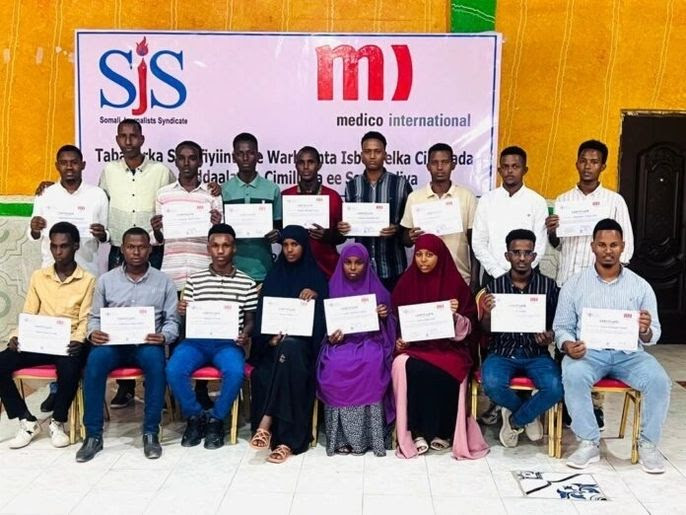The injustice of climate change disproportionately affects ..
|
The Somali Journalists Syndicate (SJS) has completed another round of training to enhance climate change reporting and promote climate justice for journalists in Somalia’s Hirshabelle State. |
|
|
|
The three-day program held in Beledweyne, Hiiraan region of Hirshabelle State from 20th – 22nd October, 2024, involved 15 local journalists. The training focused onclimate-focused journalism, aiming to raise awareness among local communities in the region. |
|
|
|
Beledweyne and Jowhar, the two main cities of Hirshabelle State, along with nearby towns, are among the areas hardest hit by recent floods, which have displaced thousands of families and severely disrupted lives. In December last year, NGOs reported that90% of Beledweyne’s residents were displaced by flooding. In Jowhar, 77,000 people weredisplaced, with the city being one of the areas most affected by El Niño-related flooding. Although Hirshabelle is rich in agricultural land due to its riverine geography, recurrent droughts and flooding have forced communities into constant displacement. |
|
|
|
Rowda Hussein Ali, a journalist with HiranWeyn Radio in Beledweyne, shared her perspective: "This is my first-ever training on climate change. Although I was born here and have lived through various humanitarian crises and flooding events, I didn’t have much understanding about climate justice or the critical role of journalists in raising awareness about these issues,” Rowda said. |
|
|

| Rowda Hussein Ali, a journalist with HiranWeyn Radio in Beledweyne, speaks to SJS after completing a three-day training on climate change reporting. | PHOTO/SJS. |
|
|
|
|
Another participant, Sadia Osman Abdi from Wadani FM, noted, "This training was particularly important for me as I am now equipped to engage in discussions seeking solutions for my community. Last year, my family and I fled our home after our neighborhood, Bundo Weyn, was severely flooded with water from the Shabelle river. All our neighbors were displaced, and the area we fled to became overcrowded, leading to disease outbreaks and surges in food prices due to disrupted supply chains. This made me to think about how best we can address this problem. I think my role is to raise the awareness over and over.” |
|
|
|
Women journalists like Rowda and Sadia face additional challenges in a patriarchal society whenever they report on climate issues. They are often told that "women should stay home and serve the family, not speak on the radio.” They now want that culture to end. |
|
|

| Sadia Osman Abdi from Wadani FM speaks to SJS after completing a three-day training on climate change reporting. | PHOTO/SJS. |
|
|
|
|
"We all face the same problems of climate change, and we must remember that there are women-headed households who want to be part of the discussion. I want to tell my community that we must work together as one, without the stereotypes surrounding our genders,” added Rowda. |
|
|
|
During the training, however, SJS mentors encouraged both male and female journalists to contribute equally to discussions, fostering a supportive environment for women’s voices. |
|
|
|
"While the climate crisis significantly impacts communities in this region, armed conflict and terror-related violence also persist, affecting locals,” said SJS Secretary General Abdalle Mumin. "This training not only equipped local journalists with new skills but also provided an opportunity for them to discuss and strategize on how to better report on climate impacts and advocate for climate justice.” |
|
|

| Journalists engage discussion during SJS journalistic training on climate change in Beledweyne. | PHOTO/ SJS. |
|
|
|
|
Mr. Mumin added, "Effective media reporting can save lives and is part of the solution. We are grateful to Medico International for supporting this initiative, enabling us to train 30 local journalists—both men and women—on this critical topic affecting communities here.” |
|
|
|
The injustice of climate change disproportionately affects vulnerable groups in Somalia, including women, children, and rural communities. These impacts extend beyond daily life, affecting security, the economy, and social cohesion. |
|
|
|
"Half of the communal conflicts in Somalia are linked to resource disputes over grazing land, water, and food. This underscores that climate change is impacting peace and stability, which is why it is essential for local media to be part of the solution,” Mr. Mumin concluded. |
|
AFEEF:
Hadhwanaagnews marnaba masuul kama aha Aragtida dadka kale. Qoraaga ayaa xumaanteeda, xushmadeeda iyo xilkeeda sida. waxa kaliya oo Hadhwanaagmedia dhiirigalinaysaa, isdhaafsiga aragtida, canaanta gacaliyo talo wadaagga!
 hadhwanaagtv
hadhwanaagtv